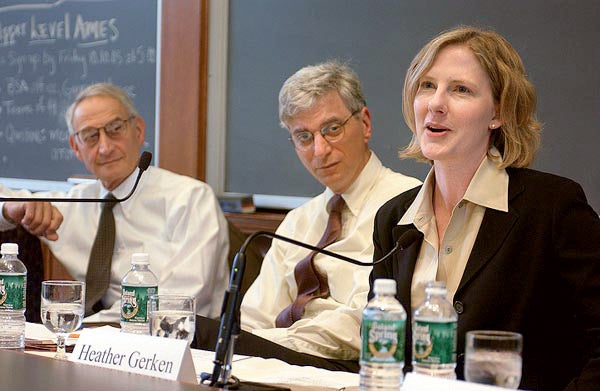Three days after the U.S. Supreme Court kicked off its 2003-2004 term, HLS faculty members evaluated the Court’s recent decisions and forecast its upcoming cases.
Part of a new series of events known as the Dean’s Forum, the 90-minute panel discussion moderated by Dean Elena Kagan ’86 featured four HLS professors: constitutional scholar Richard Fallon, federalism expert Daniel Meltzer ‘ 75, voting rights specialist Heather Gerken and Charles Fried, the former solicitor general and member of the Massachusetts Supreme Judicial Court. Fried has argued more than 30 cases before the U.S. Supreme Court.
Fallon said he believed the affirmative action cases at the University of Michigan were significant because the Court essentially preserved affirmative action on college campuses, though it would have to be carefully administered going forward. He also said the Lawrence v. Texas case, in which the Court ruled that sodomy laws were unconstitutional, would possibly have an impact on future decisions about gay marriage and gays in the military.
Other significant cases, according to the panelists, included a voting rights and race redistricting case and a case challenging states’ sovereignty relative to the 11th Amendment and the Family and Medical Leave Act.
Looking at this year’s term, now under way, the panel correctly predicted that the Court would take on the case of Elk Grove Unified School District v. Newdow, to settle the question of whether the phrase “one nation under God” in the Pledge of Allegiance is an unconstitutional mixing of church and state. The case was appealed after the Ninth Circuit Court ruled that the First Amendment and the Supreme Court’s own precedents indicate that publicly funded schools can’t tell pupils to declare allegiance to one nation “under God.”
“The Ninth Circuit is quite a place,” said Fried, to laughs. “You’d almost think the Supreme Court exists to overturn the Ninth Circuit.”
The panel agreed the case would likely be overturned, noting that the use of the word “God” is everywhere in government, even at the highest court, where “God save the Supreme Court” is heard at the start of every session.
The constitutionality of the McCain-Feingold campaign finance law, addressing soft money and election ads, may also be taken up, according to Gerken.
The panel also predicted that several Miranda cases may show up on the docket, along with a case asking whether a state may use tax revenue to award college scholarships to students who would then use them to attend religious institutions. Meltzer added that “it’s only a matter of time” before the Court sees cases about the detention practices of federal officials in the wake of Sept. 11.
